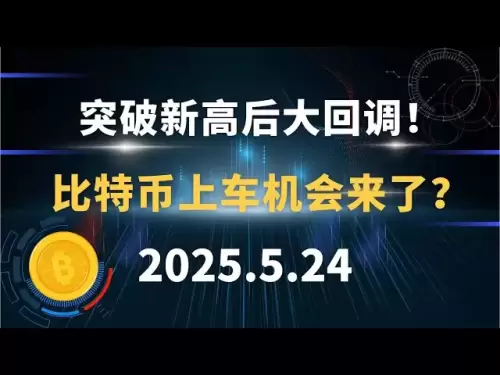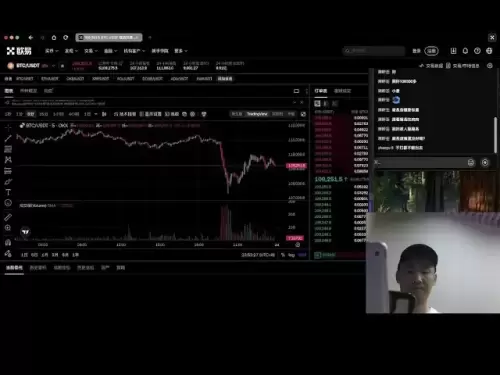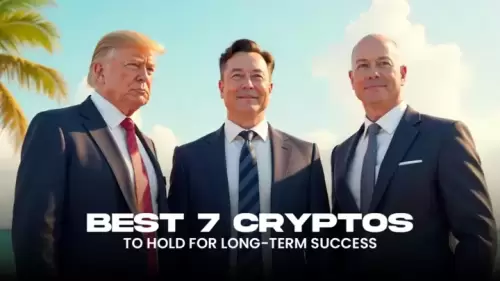 |
|
 |
|
 |
|
 |
|
 |
|
 |
|
 |
|
 |
|
 |
|
 |
|
 |
|
 |
|
 |
|
 |
|
 |
|
Cryptocurrency News Articles
The current structure of capital markets is failing to serve a broad base of investors
May 24, 2025 at 07:02 am
According to Akshay BD, non-chief marketing officer at the Solana Foundation. During a panel at the Accelerate 2025 conference, Akshay argued that blockchain technology could help address these shortcomings
Non-chief marketing officer at the Solana Foundation Akshay BD argued that the current structure of capital markets isn't serving a broad base of investors, especially as
Optimism towards a 60-40 portfolio isn't working in a long time and younger investors are struggling to keep up with older generations who managed to purchase property early and benefitted from rising asset prices, while also having time in the market on their side.
"You have low bond yields, you have asset price bubbles, and people don't really know how the traditional asset allocation model works anymore. The 60-40 portfolio hasn't delivered consistent returns in a long time, and there's a growing sense of uncertainty among investors. Investment managers are reporting that clients are feeling more anxious and burnt out, especially the younger generation who feel like they're starting the game later and have less time to recover if things go wrong.
"And a lot of this tension is due to a widening gap between the income earned through wages and wealth accumulated through asset ownership. Retail investors are largely locked out of private markets, which are typically accessible only to accredited investors, a dynamic that may be contributing to overheated public markets.
"This tension will only escalate with the rapid advancement of artificial intelligence, which could further deepen existing economic divides. So the question is, which way do we go? Is it ... universal basic income, where we're essentially creating a welfare economy to support those unable to keep jobs or own assets? Or is it what we propose, universal basic ownership, where everybody with a mobile phone can own assets?"
In the Solana ecosystem, the "Non-Chief Marketing Officer" (nCMO) is a role within the Solana Foundation that focuses on supporting the Solana community's marketing efforts. It seems that Akshay is focused on highlighting the potential of blockchain technology to help address these shortcomings, saying that Solana could "make everyone an investor or a dreamer over time."
This would involve crypto infrastructure facilitating broader asset ownership, allowing individuals to invest in anything they wish, from energy companies to local coffee shops, through tokenization.
"We can create a world where people can invest in anything they care about, whether it's a solar energy company or a coffee shop down the street. Imagine scanning a QR code on a coffee cup to invest in the local roastery or a restaurant that serves amazing food. This isn't science fiction; we have the technology to do this today.
"We're not limited to investing in large, publicly traded companies. We can invest in anything we choose, and we can do so in small increments that fit our own budgets. This opens up possibilities that weren't available before. People can become owners of the companies and organizations that they use and support daily."
According to Akshay, this could help combat the overheating of certain markets, a lofty goal that some sectors of crypto, like RWA tokenization, aim to facilitate. Akshay noted that some entrepreneurs had tried this before, but the available technology didn't support this view.
"People have tried to do this before, but the technology wasn't there yet. They envisioned a world of modularity and fluidity, but they couldn't quite achieve it. But now, with the dawn of Web3, we can finally realize these ambitions. It starts with the game, and very quickly becomes interesting, but it's also economically efficient.
"What it gives you is the ability for you to financialise all the productive assets in an economy, so you can have anybody who participates in that economy be an owner of that economy. It’s efficient in terms of capital allocation because capital flows to the best opportunities, and it creates a more engaged and invested society, where people feel a sense of belonging and contribution."
According to data from market analytics firm Multpl, the S&P 500's price-to-earnings (P/E) ratio has consistently remained above 19.6 since December 2018, higher than the index's historical average P/E ratio of around 16.1 and suggesting that investors have been willing to pay a premium for earnings in recent years.
Zooming out, the S&P 500's average valuation has been gradually rising for decades, driven by factors such as low interest rates, growing corporate gains, and investor optimism about technology. However, high valuations have also coincided with periods of market corrections, like the dot-com crash and the 2008 financial crisis after the collapse of the subprime mortgage market.
Disclaimer:info@kdj.com
The information provided is not trading advice. kdj.com does not assume any responsibility for any investments made based on the information provided in this article. Cryptocurrencies are highly volatile and it is highly recommended that you invest with caution after thorough research!
If you believe that the content used on this website infringes your copyright, please contact us immediately (info@kdj.com) and we will delete it promptly.
-

- XRP Price Eyes $4 Following Bullish Reversal
- May 24, 2025 at 03:50 pm
- The XRP price action, which has been building a bullish structure since dipping into the discounted range around $0.85 to $1.00, is now showing signs of a trend continuation that could take it beyond the $3 psychological resistance and up to the $4 mark.
-

-

- On May 23, 2025, crypto lender Ledn confirmed it will stop supporting Ethereum (ETH) and shift entirely to a bitcoin-only lending model. The move takes effect on July 1, 2025, and comes as part of a broader strategy to simplify services and minimize risk.
- May 24, 2025 at 03:45 pm
- On May 23, 2025, crypto lender Ledn confirmed it will stop supporting Ethereum (ETH) and shift entirely to a bitcoin-only lending model.
-

-

-

-

-

-

- Polygon (MATIC) Co-Founder Mihailo Bjelic Steps Away from Project After Seven Years
- May 24, 2025 at 03:30 pm
- Mihailo Bjelic, one of the original co-founders of Polygon (formerly Matic Network), announced on Friday that he is stepping down from his roles at both Polygon Labs and the Polygon Foundation board.





























































